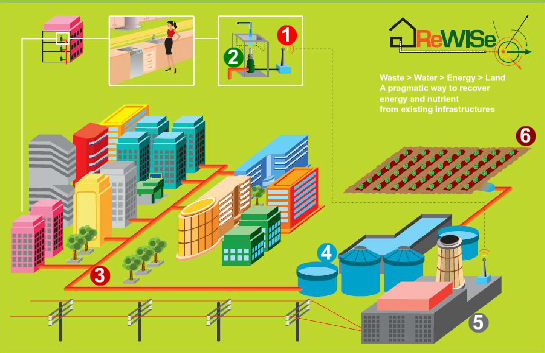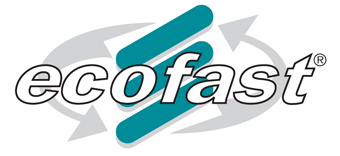
RE-WISE aims at promoting a new integrated practice for the decentralized (district) production of electricity and heat from biogas, whereby the biogas is produced through anaerobic co-digestion of organic food waste in district wastewater treatment plants equipped with a primary clarifier and a sludge digestor, and the organic food waste is conveyed to the district wastewater treatment plant through the existing sewerage network after having been ground through food waste disposers.
As such RE-WISE promotes a new model for improved disposal of kitchen food waste to enable decentralised production of energy/heat, reduced solid waste collections, and divertion of biodegradable waste from landfill. In this model, the amont of food waste contributed through use of a new generation of “intelligent” food waste disposers can be recorded and used to calculate distribution of benefits for citizens and for all stakeholders composing the value chain.
The proposed action builds on the creation of Sustainable Energy Communities comprising partnerships of conscientious citizens with responsible infrastructure owners/operators in allowing the controlled boosting of civil wastewater with readily biodegradable organic load, thereby increasing the production of biogas through anaerobic co-digestion in district wastewater treatment facilities wherever organisational, infrastructural, socio-economic and geographical conditions render this model more favourable than other waste management practices.
See the ReWISe fact sheet

1- Innovative controlled practice: Re-WISe creates an attractive business opportunity for service providers in wastewater management because the intelligent Food Waste Disposers are capable of quantifying the mass of the processed food waste. This information can be then relayed among different disposers of the same type inside the same building, and the data communicated to the service provider, which in turn calculates an offset to be granted to users for their contribution to the generation of green energy. As a result, Food Waste Disposers are NO MORE a cost but a BUSINESS OPPORTUNITY for service providers as well as an economic opportunity for families!
2- Intrinsic selection capability: Thanks to their design, Food Waste Disposers can be used to divert a high portion of separated organic waste from conventional waste disposal and contamination with unsuitable material is prevented; the secret lies in their specific grinding technology (no cutting blades) and in their location (the kitchen sink), preventing people to dispose any other matter than food residues.
3- Collection and conveyance: The ground food waste is collected and conveyed to the wastewater treatment plant through the existing sewerage network. This allows savings to be made in the costs associated with separate source collection (such as kerbside collection) and transportation of the biodegradable fraction od Municipal Solid Waste, with trasnportation routes ferquencies being reduced from e.g. twice-weekly to e.g. biweekly.
4- Digestion: The Re-WISe model for the management of organic food waste exploits existing infrastructures (the anaerobic digester for secondary sludge) where the ground food waste is co-digested with the sludge. As such, there is no need for the construction of any kind of treatment plant. The NIMBY (Not In My Back Yard) syndrome is thus not applicable!
5- Energy: The consistent increase in biogas production strongly justifies the installation of a small power generator to gather “green” electrical energy (sellable to the national network) and thermal energy that can be reused at the anaerobic digestion plant (to operate thermophilic digestion as well as for sludge drying).
6- Fertilizer: The digestate that is obtained as the final product of anaerobic co-digestion of organic food waste has a very high content of nitrogen with respect to the digestate obtained by anaerobic digestion of sludge. As a result, this Nitrogen-rich digestate is particularly suitable for plants growth and can be further processed to be employed as fertilizer.
The RE-WISE model
RE-WISE introduces an innovative controlled practice for the management of the organic food waste that is daily produced by urban communities. Each family adopting a Food Waste Disposer, the familiar and user-friendly household appliance that has now been rendered ?intelligent?, is able to select the food waste and to collect and convey it through the sewage to the wastewater treatment plant. At the plant the organic matter is digested in the existing anaerobic digester and the biogas obtained is used to produce energy. The digestate resulting from the anaerobic digestion is appropriately used as fertilizer.
These key elements together enable the establishment of a win-win Business Scheme in which:
- citizens (or small industrial sites) can be rewarded through monetary incentives for instal lat ion of disposers and/or through monetary bonuses to be directly calculated on the base of the organic food waste they ef fect ively dispose through the sewerage system, thus upon their responsible contribution to the increased production of Green Energy from biogas;
- municipalities can profit from reductions in costs associated to i) savings in transportation of the biodegradable fraction of Municipal Solid Waste (transportation routes frequencies being reduced from e.g. twice-weekly to e.g. biweekly), and ii) savings in Municipal Solid Waste Management practices such as kerbside collection or source-separated collection as far as the biodegradable fraction of Municipal Solid Waste is concerned;
- service providers in wastewater management can profit from financial incomes associated to the increased biogas volumes to be used as Renewable Energy Source.


